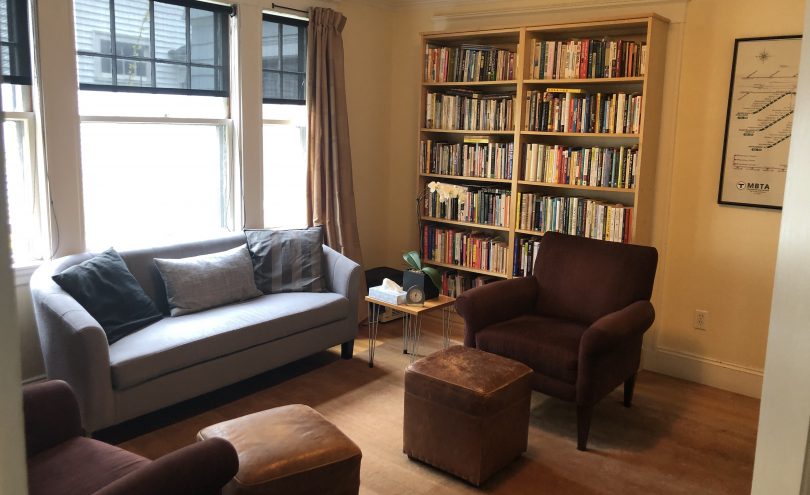By Inyeong Kim
BU News Service
In early March, many universities and colleges moved classes online and evacuated campuses as the coronavirus spread across the United States. Closures caused many campus functions to change, including mental health counseling. As access to telehealth expands, students have begun attending online sessions at home.
Gov. Charlie Baker ordered expanding access to telehealth services due to COVID-19 on March 15. Federal officials also announced that the Centers for Medicare & Medicaid Services (CMS) broadened access to a wider range of services, including telehealth, to keep the nation healthy and contain the spread of the coronavirus.
“The insurance companies are willing to pay for sessions online whereas before this crisis, insurance companies would not cover it for the most part,” said clinical psychologist Deborah Offner from Newton.
Offner closed her office, where she counsels teenagers, young adults and families, on March 13 and began holding online and telehealth therapy sessions on March 16. She said her decision was based on information from the Centers for Disease Control and Prevention.
“It’s new to me to be spending all my time on the computer,” Offner said.
Offner said more of her colleagues have also started working online and more patients have been willing to take telehealth as it becomes accessible.
“Telemedicine and teletherapy are very new phenomena in the US,” she said. “Now all of a sudden everybody’s offering it.”
Offner said expanded coverage by health insurance companies is one of the reasons telehealth has become more common.
”People not only have access because they don’t have to go anywhere and they can do it from home, but their insurance will pay for it as well,” Offner said.
Over 40% of American college students are suffering from symptoms of mental health issues such as depression. Even with the effort of the government and insurance companies, some college students are unsure of how helpful telehealth can be.
Sahdiah Cox, a Brown University student, has been attending counseling sessions online since her school closed. She said she tried telehealth once before but didn’t like it.
“It was just overall strange because I wasn’t in a counseling space,” Cox said. “The disadvantages outweigh the advantages.”
Since Cox moved back home due to the virus, she said she’s stopped scheduling counseling as frequently because she misses the physical connection.
“I feel like I do a lot of body language when I am talking to someone,” Cox said. “[The counselor] isn’t really here in the room [with me] and I can’t feel their energy.”
She said she appreciates the availability of online counseling, but she needs more interaction with her therapist.
“I think it’s important that we have these online,” Cox said. “At the same time, this [form] isn’t great for me.”
A lack of physical connection is not the only problem. Offner said patients also face a lack of privacy.
“Sometimes [patients] whisper if they’re talking about their brother, and their brother is in the next bedroom,” Offner said. “Privacy is much more of an issue.”
Offner said that compared to in-person sessions, where she would often meet with more than five patients a day, she now only meets with a maximum of four patients per day due to the circumstances. She said she worries about the longterm effects of online sessions for her patients.
“What I’m concerned about is how it will feel in a month or two months when we haven’t been able to see each other,” she said. “I think that that will be hard for support, especially for some people.”
Michigan State University student Iris Quass, 20, has opted for sending emails to her therapist rather than a phone call or video chat.
Because of the impact COVID-19 has had on her school, Quass said she’s been unmotivated. As a result, she chose not to use online face-to-face sessions even though the option was available.
Quass said she has a lot of class assignments that keep her busy, so she prefers quick emails over long phone calls. She writes a paragraph of how she’s felt throughout the week and asks her counselor for help.
Offner expressed that one of her biggest concerns is how she’ll be able to assist if a patient has an emergency.
“It can be difficult to assess an emergency situation without being in person,” Offner said. “So, if a student or patient feels suicidal, or is hurting themselves, I think those are much more difficult to assess virtually.”





